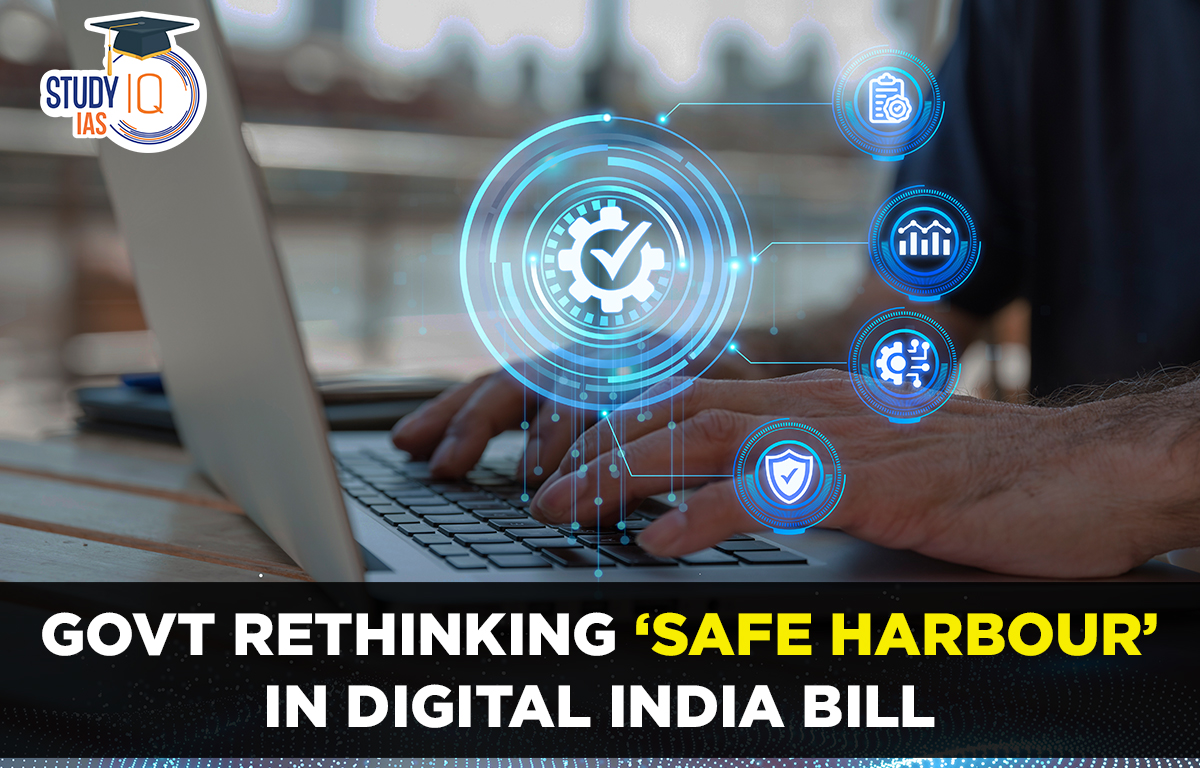Table of Contents
Context: With the proposed Digital India Bill the government is planning for reconsideration of safe harbour provisions for internet intermediaries.
About the Proposed ‘Digital India Bill’
- Purpose: The proposed law will replace the decades-old Information Technology Act, 2000.
- Currently, the Information Technology (IT) Act, 2000 is the core framework that regulates entities on the Internet.
- Need for a new law: The IT Act, 2000 needs an update since it was framed for an Internet era that looked very different from the Internet of today.
- Given its limitations, the government has also on occasion found it difficult to promulgate rules since the parent Act is limited in its scope.
- Core objectives of the proposed Digital India Bill:
- To ensure an open and safe Internet in the country to ensure users’ rights and reduce risks for them online.
- To accelerate the growth of technology innovation.
- Key aspects of the Digital India Bill:
- An overarching framework: The Bill is a key pillar of an overarching framework of technology regulations the Centre is building, including:
- The draft Digital Personal Data Protection Bill, 2022;
- Indian Telecommunication Bill, 2022; and
- A policy for non-personal data governance.
- Classification of internet intermediaries:
- Present scenario: Under the Information Technology Act, 2000, there is no classification of intermediaries.
- Proposal: The new law will prescribe different kinds of intermediaries because their regulation must be different. Intermediaries will be bucketed as social media platforms, e-commerce platforms, AI platforms, fact-checking platforms etc.
- An overarching framework: The Bill is a key pillar of an overarching framework of technology regulations the Centre is building, including:
- New Regulator for Internet: The new Bill is also expected to prescribe a new regulator for the online space along the lines of the Telecom Regulatory Authority of India (TRAI) or the Securities and Exchange Board of India (SEBI).
- Regulating emerging technologies: The new law is also expected to introduce penal consequences for violations and prescribe governing provisions for emerging technologies like the metaverse and blockchain.
- Regulation of online crimes: The proposed law will also regulate a range of crimes that the government thinks are unique to the online space.
- The law will aim to curb the weaponisation of misinformation” under the garb of free speech, and other harms such as cyberbullying, doxxing, and identity theft etc.
- Cyber jurisprudence: The Bill will also explore an efficient adjudicatory mechanism that is readily accessible, provides timely remedies, resolves cyber disputes and establishes a cyber jurisprudence for the future.
- Safe harbour provisions: The government is considering modifying the existing safe harbor rules for internet intermediaries with the proposed law.
What are Internet Intermediaries?
- Internet intermediary refers to a company that facilitates the use of the Internet. Such companies include internet service providers (ISPs), search engines and social media platforms.
- Examples of internet intermediaries in India include:
- Social media platforms such as Facebook, Twitter, and WhatsApp
- Search engines such as Google, Bing, and Yahoo
- Content-sharing platforms such as YouTube, and Vimeo.
- These intermediaries are regulated by the Information Technology (Intermediary Guidelines and Digital
What is ‘Safe Harbour’
- About: Safe harbour – as prescribed under Section 79 of the IT Act, 2000 – is legal immunity that online intermediaries enjoy against content posted by users on their platforms.
- This is available as long as these platforms abide by certain due diligence requirements, such as censoring content when asked by the government or courts.
- Origin: The concept originally came from Section 230 of the United States’ Communications Decency Act, which has been termed “one of the foundational laws behind the modern Internet”.
- The need: Tech experts believe that safe harbour is a crucial tenet for ensuring free speech on the Internet since platforms only must act on speech that is deemed illegal.
- It is one of the main reasons behind the meteoric rise of Internet giants such as Facebook that have defined the Web 2.0 era where users can post content on the internet.
- Cyberbullying: Cyberbullying is the use of electronic communication to harass or harm someone, often repeatedly and intentionally.
- Doxxing: Doxxing is the act of publicly revealing or publishing a person’s private or identifying information online without their consent.
Why is there a need for reconsidering the safe harbour provisions for internet intermediaries
- Issues with the safe harbour provisions:
- Intermediaries misusing safe harbour protections to evade responsibility for harmful content on their platforms.
- The difficulty of applying a one-size-fits-all approach to the diverse range of intermediaries and services provided on the internet.
- The challenge of balancing the need to protect free speech and expression with the need to prevent harm and illegal activity online.
- Changing Nature of Internet Intermediaries: The intermediaries have evolved into multiple types of participants on the internet that are functionally different from each other, requiring different types of guardrails and regulatory requirements.
- Complexity of Intermediaries: The increasing complexity of intermediaries over the last two decades has made it challenging to offer them a unified safe harbour provision.
- Global Reconsideration of Safe Harbour Norms: Countries around the world, including the US, are reconsidering their respective safe harbour norms, where the concept originated.


 Mukhyamantri Majhi Ladki Bahin Yojana, O...
Mukhyamantri Majhi Ladki Bahin Yojana, O...
 Nipah Virus (NiV): Structure, Testing Me...
Nipah Virus (NiV): Structure, Testing Me...
 Elon Musk’s America Party: A New Chapt...
Elon Musk’s America Party: A New Chapt...





















